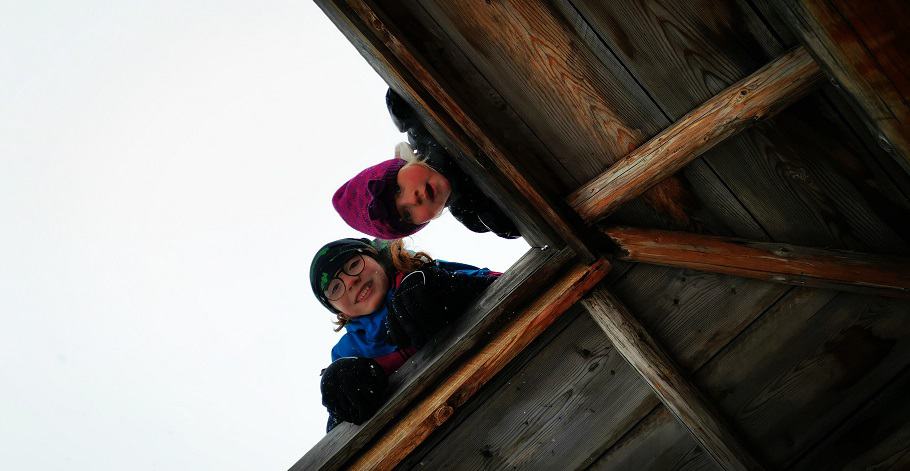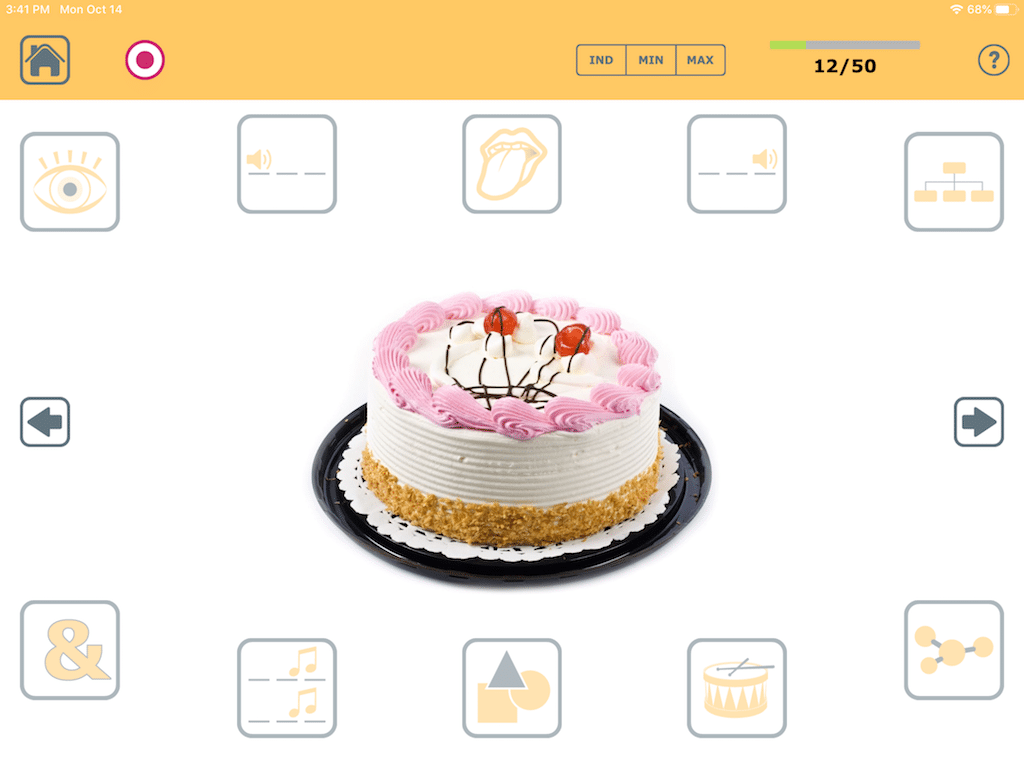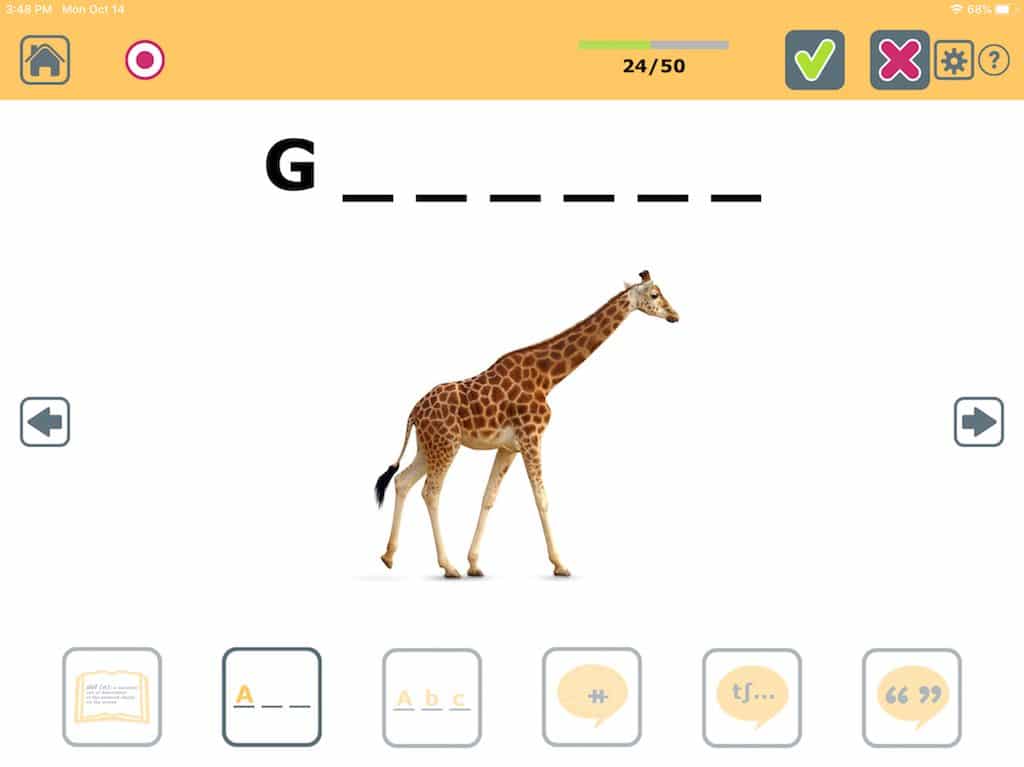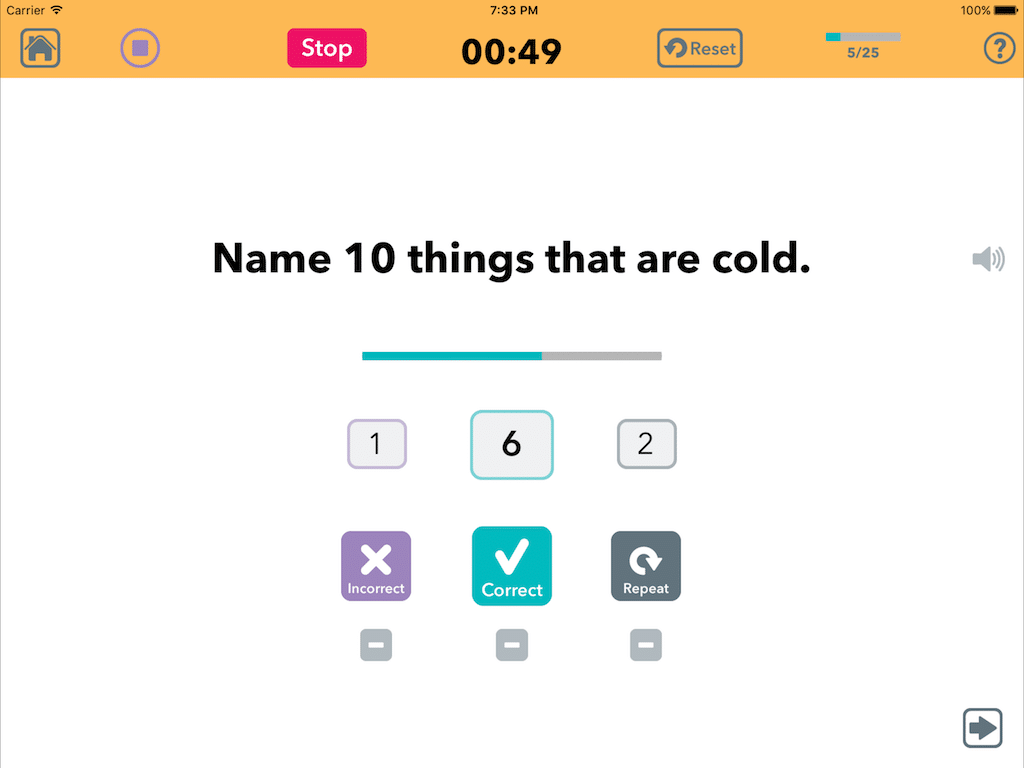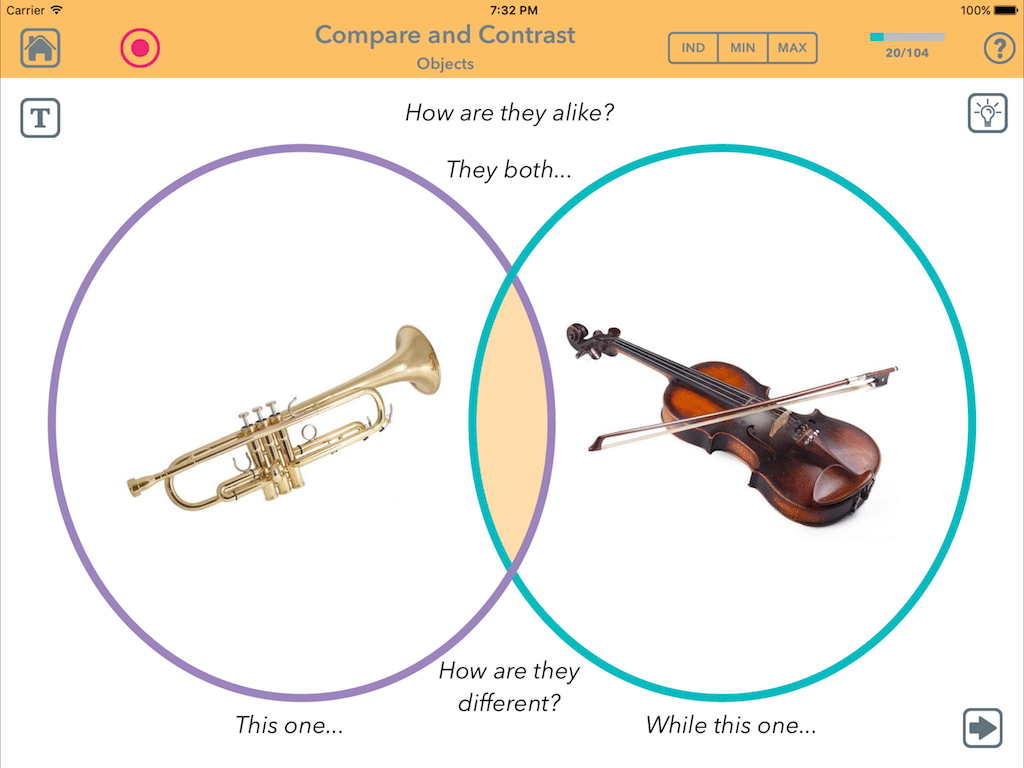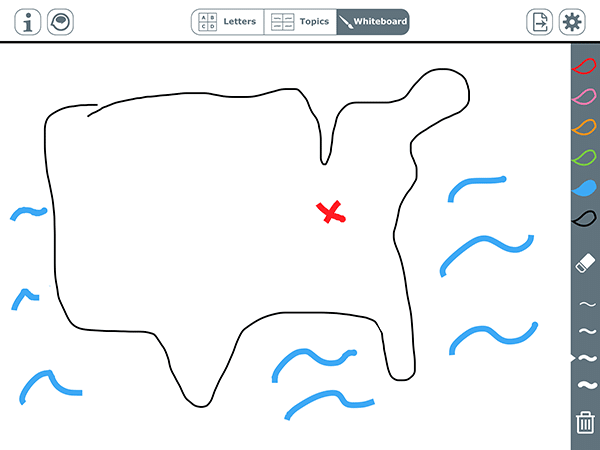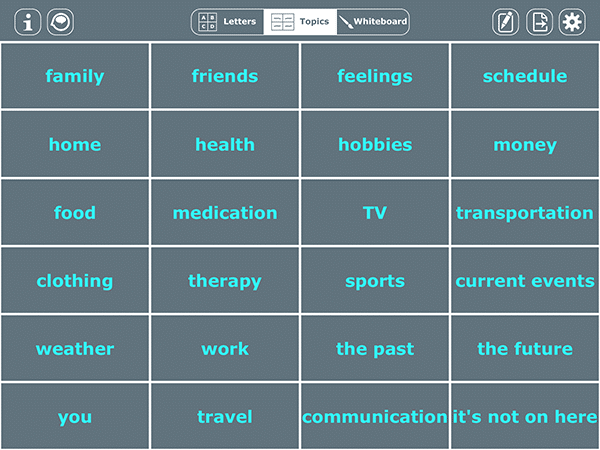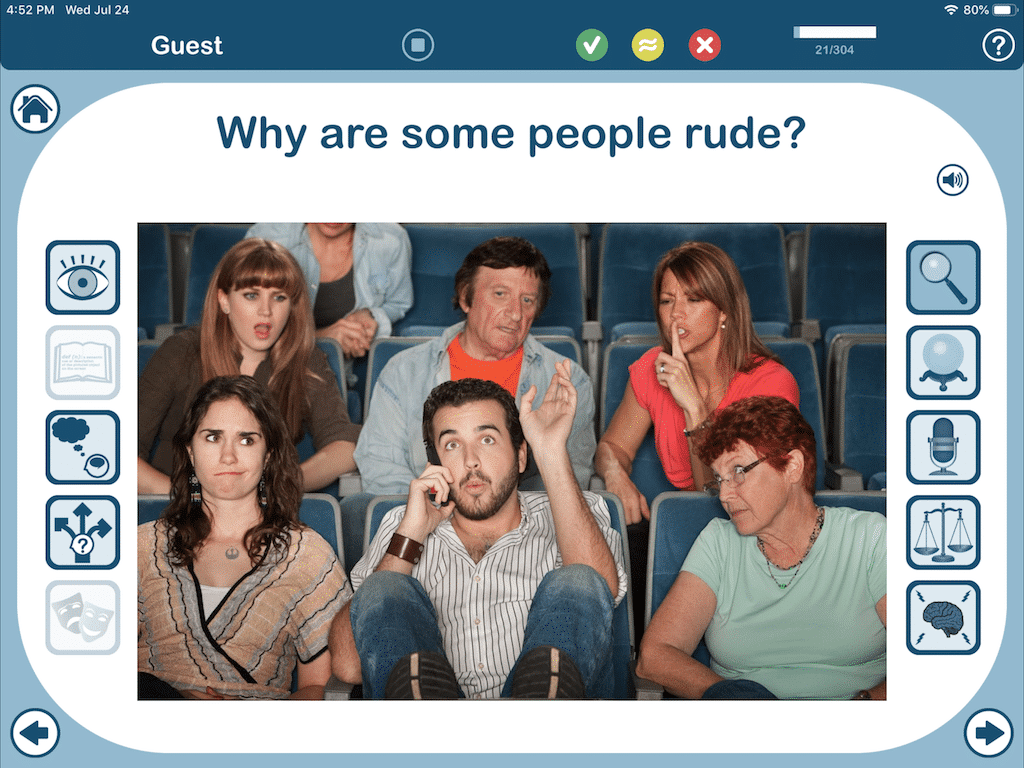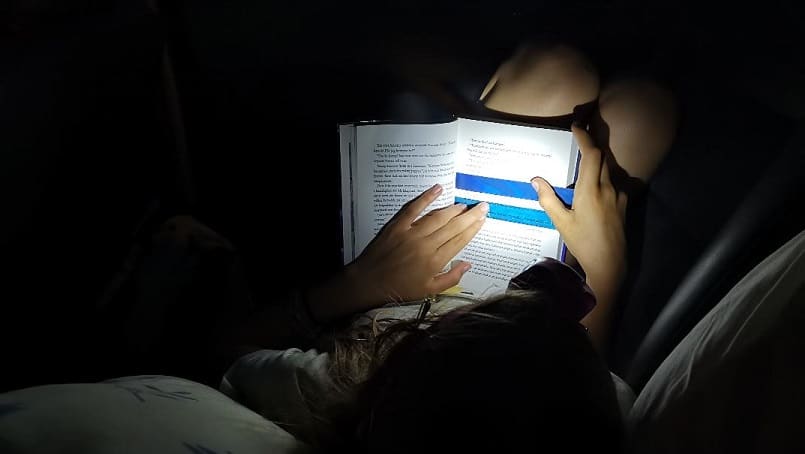
Imagine you’re sitting in a car driving by a billboard plastered with a city where your cousins live. You open your mouth to tell your mom you want to visit again, but the name of the town is gone!
”Mom, I’d love to visit. . . That place. . . hmmm. . . the city we visited that one time. . . when I fell down sledding. . . We visited relatives. . . They owned a dog. . . Do you remember? It’s on the tip of my tongue, but I can’t get it out!”
This is a ‘Normal’ experience for my 12-year-old daughter who struggles with extreme dyslexia. Words randomly disappear as she talks.
Problems with word retrieval or word-finding can manifest in different ways, suddenly being at a loss for words, trouble remembering how a word sounds, or saying a similar but wrong word are a few issues dyslexic people struggle with. These stumbling blocks are some of the most common signs of dyslexia, and they aren’t isolated to the spoken word. Writing can present similar problems.
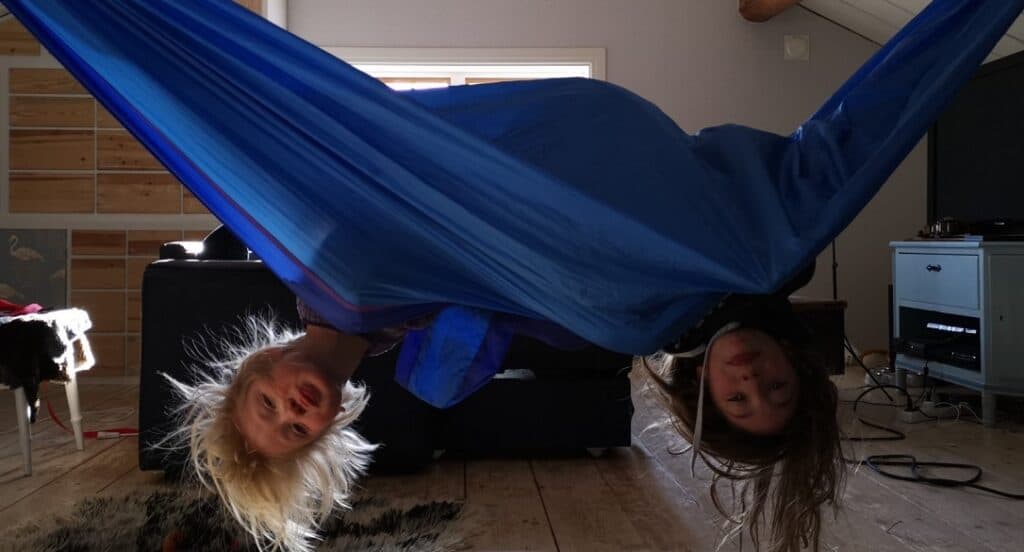
How Dyslexia Affects Social Skills
Kids who struggle with word retrieval are often behind in reading and writing, but most people don’t automatically associate falling behind socially or social ostracization with dyslexia.
Dyslexia and Hanging Out With Peers
Imagine your standing with a group of friends and having a rapid conversation. Suddenly you inject with, ”The other day my brother did something really funny! We were at McDonald’s and he. . . he. . . um. . .whats the word?. . ” Your friends probably don’t have the attention span or the patience to wait for you to find the right word. By the time you think of what you want to say the conversation moved on and your story is no longer relevant.
This can happen to the best of us, but if it happened nearly every time you tried to tell a story or answer a question in school it wouldn’t be funny.
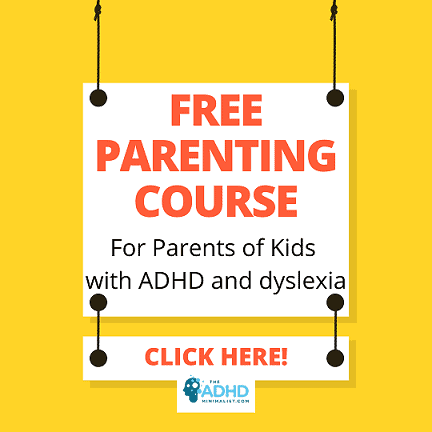
Dyslexia and Communicating in Writing
Writing assignments can present their own problems. Besides flipping letters around kids with dyslexia take more time to write and may use simple words with general meanings to replace specific words they forgot.
Trying to send an SMS to a friend can be a frustrating experience, and children who haven’t learned to laugh at their mistakes may be deeply hurt when their funny writing mistakes circulate around the school.
Dyxlexia and Stress
Fear of being laughed at and fear of failure can increase stress. Stress causes those with dyslexia to forget more words and make more mistakes. If it’s possible to establish over time that their class at school, youth group, or sports team is a safe place this helps to diminish stress and thus decrease unnecessary mistakes.
If on the other hand, these social constructions are obviously not safe the child may be picked on or the brunt of jokes. Sometimes kids can be ruthlessly cruel. Quitting a sport or the girl scouts is one thing, but when bad experiences at school are the issue teachers and parents need to step in and help.
Dyslexia and Being Misunderstood by Teachers
Teachers need to be aware of practices that embarrass children. Children who are constantly embarrassed by teachers feel they want to crawl in a hole and hide or be disrespectful. The teacher may be completely unaware they are embarrassing a child or part of the problem.
Some kids are outright disrespectful, and others may only daydream about what they would like to say and do to a particular teacher. Either way, if the child already feels labeled subpar by their teacher they may feel making decent friends is hopeless and quit trying.
Being humiliated takes loads of emotional energy whether it’s from a teacher or a peer. It also dictates the behavior of the humiliated child. Fight or flight instincts kick in. Some kids have it out right then and there while other kids run and hide. The school bathroom is a common refuge for kids who release pent-up emotions in tears.
Spending all this emotional energy exhausts the child causing them to make more mistakes, and it’s nearly impossible to make positive connections with peers when in this state unless the child already has a best friend with a shoulder to cry on.
Planning silent revenge is distracting, takes time and energy, and isolates children from their peers. I should know I was one of those kids.
Humiliating examples from my own life.
History class
In the fourth grade, my teacher often asked the class to read a chapter in one of our textbooks. When we were done reading she had something fun for us. I watched as all the fast readers speed through the chapter and ran off to have fun. I was always left plundering through the chapter reading even slower when distracted by the fun at the back of the room.
These mandatory reading times were torture. A boy and girl also slow readers were usually by my side saving me from total humiliation. I hadn’t yet learned to cheat. I never cheated by looking at others’ answers or sticking a paper up my sleeve, but I learned to pretend I’d read what the teacher required. If I needed to understand something I read it at home.
If you teach try setting a time for reading, when the time is up let the class know they can read the rest at home if they didn’t finish. If you have a fun activity planned let the whole class start at the same time. Kids with dyslexia can’t help it if they’re slow readers. Showing dyslexic kids how much slower they are compared to their peers sucks the last sliver of joy out of reading.
Math Class
A few years later I decided it was time for me to start paying attention in math class. I never liked math. I spent most lectures daydreaming, and consequently, I had to ask for help after school to catch up. On this particular day, I decided to do my best to pay attention in math class. I wanted to see if listening would help me get my homework done faster.
I fixed my eyes on the teacher and tried my best to understand her explanations. Suddenly she looked me in the eyes and demanded to know why I was not reading along in my math book! I was so completely taken aback I didn’t think of anything coherent to say. All my words were gone, panic set in and only one phrase raced through my head was, ”I didn’t do anything wrong, I was paying attention!”
I stammered something about listening, all the while feeling 40 eyes boring into my back! My humiliation wasn’t over. Apparently, my lack of eloquence made me look more suspicious than ever. The teacher’s dark eyes swept me up and down. What are you hiding in your lap? You seem to be playing with something instead of reading. I placed my hands on the desk. There was nothing to see except raw cuticles from constant picking. Fiddling was the one thing that channeled my energy and kept me in my seat.
After the class was over I realized I should’ve explained that I had reading difficulties and it was more distracting than it was helpful to follow along in my book. I learned better by listening and remembering, but I never explained myself. I decided to spite my teacher by never paying attention in her class again. Unfortunately the only person this hurt was me.
How Children Respond to Their Social Difficulities
These responses are gleaned from years of observing my son and daughter and their struggles with dyslexia, interviews, and my own responses to dyslexia.
Those who screened me as a child didn’t think my dyslexia was bad enough to warrant help. I went on to chronically misspell words, flip letters and numbers around, forget words, and feel that I was not as smart as my classmates. This feeling of inadequacy drove me to prove everyone wrong. I became adept at asking for help and eventually graduated as a straight-A student.
Not everyone responds to learning difficulties the same way. Some kids feel they don’t measure up in academics and take on a persona like the class clown or the teacher’s pet. They may strive to excel at sports or extra circular activities to make up for low grades, or they may give up altogether and quit trying.
Going with or against the flow
Sometimes kids chose to go with the flow and sometimes they get sick of never getting a word in edgewise.
When my daughter was younger (first and second grade) she had days when she was extremely hard to get along with. She got fed up with never being listened to by friends. She wanted to be the one who decided for once and she refused to compromise. On days like these, I was completely exhausted by the time her friend went home. I spent most of the playdate smoothing over problems and trying to negotiate compromises.
Tears
Other days she felt completely tongue-tied and burst into tears repeatedly. I think her crying days were when her dyslexia was at its worst. On emotional days she cried at inopportune times and teachers and friends didn’t understand what was wrong.
Teachers often tried to get to the root of the problem, but that’s hard when nothing ‘HAPPENED’ to cause tears. She couldn’t explain what was wrong, and friends seemed to think she was weird.
Patience or impatience
Kids with dyslexia usually have the patience to explain what they are trying to say despite missing words. This takes time. Grown-ups (hopefully) have the patience to listen to kids clarify what the missing words are. This usually involves explaining what happened in particular places or describing attributes of items or people they forgot the names of. While grown-ups guess words until the child excitedly shouts, ”That’s it!”
They know what they want to say, but their communication tools suddenly went up in smoke. Think of it like stage fright. You’re on-stage performing Romeo and Juliet when you look at the audience. The staggering number of people watching you makes you nervous and tongue-tied. Suddenly the lines you practiced hundreds of times disappear! For kids with dyslexia and word retrieval problems, the stress and forgetfulness of stage fright happens in everyday life.
Choosing to be alone
When kids find social experiences frustrating they may choose to spend most of their time alone.
Excape
There have never been so many means of escape at our fingertips as in society today!
Most kids have a smartphone. It’s easier than ever for them to create their own bubble where they obsess over a TV series or disappear into an online game. When I was a kid I escaped into my bubble from time to time, but I didn’t have a smartphone I used my imagination. I was a daydreamer.
The Best Friends Trap
A child may have a best friend. In some ways, this feels safe. Kids automatically know who they want to be with when they have free time, but the ‘Best Friend’ can also be a trap.
I’ve seen friendships come and go, and those who only invest time in one friend set themselves up for loneliness when that friendship ends.
When your child is in the middle of a really great friendship you think it will last forever. Unfortunately, friends from grade school and middle school rarely stand the test of time. Kids grow like weeds during these years. They develop physically, emotionally, and mentally, and their hormones start wreaking havoc. They change and friends change.
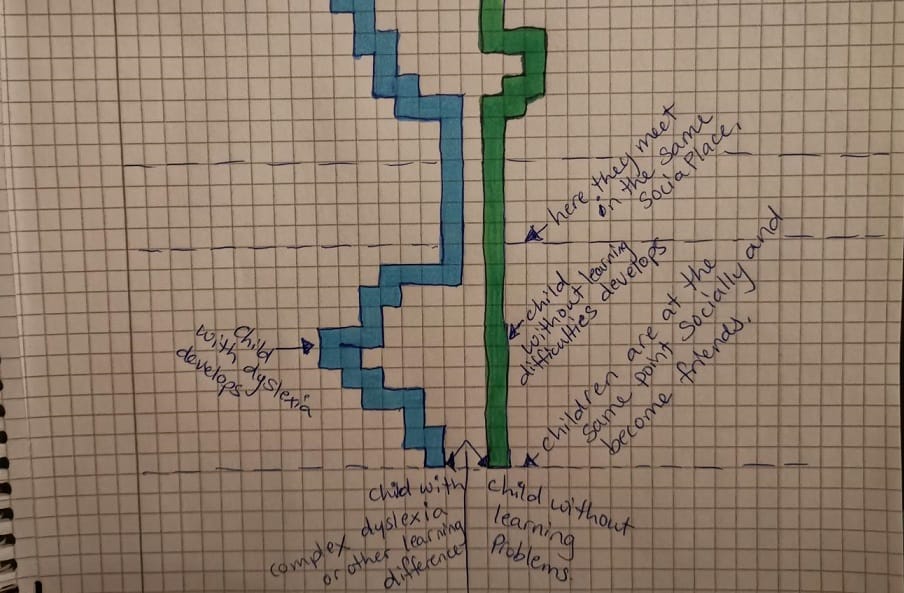
Kids with learning differences (disabilities) add another complicated layer to this complex picture. They may be on the same page with a best friend one year only to realize that their friend grew and matured during the summer while they didn’t. You could say their friend outgrew them. Kids with learning differences may lag behind during periods of learning or development. Often they catch up later, but it’s hard to be on the same page with a best friend through all these ups and downs. It’s best to have several friends.
Clinginess
If a child finds the social intricacies at school scary they may find a friend they would like to have as a best friend and cling to them like a vice. This predetermined ‘Best Friend’ may or may not want this role.
What the dyslexic child is after is someone to guide them through social situations when they don’t know what is expected of them. Someone to ask questions of when they don’t understand a fast-paced conversation and a friend to listen when they try to explain words that they forgot.
If the new ‘Friend’ doesn’t want a tag-a-long the child may be embarrassed or hurt.
Choosing Activities Instead of Friends
When kids find hanging out with several friends during a school break frustrating they may choose what they want to do during break and let the activity determine which classmates they hang out with.
There is nothing wrong with this. The child will probably be with a variety of kids from different classes and these schoolmates will change from recess to recess. The one thing to think about is that they will most likely not be going deep in these friendships. While peers from their class may hang in the same group every deepening their friendships your child is working on basketball, soccer, or ping-pong skills and general niceties.

How to Help
Cultivate Friendships
Parents can help. Children who have trouble reading social cues or who can’t keep up with a rapid conversation need to spend time strengthening the bonds of friendship one on one.
Invite Friends over to your house one at a time. Be available to sort out disagreements, and suggest activities if necessary.
Lend a Listening ear
Make sure you have a positive relationship with your child, and you give your child a chance to share about their day at school. Keep your ears open. Maybe you need to invite a particular friend over, talk to a teacher, or give encouragement.
Talk to the Teacher or Principle
If you notice your son/daughter is having a hard time in a particular class make sure the teacher knows the difficulties your child has and how they can help.
If your child expresses extreme frustration or resistance to being in a particular class (They may be skipping class or in a bad mood when a particular teacher’s class rolls around every week) try to get to the bottom of the problem.
Don’t accuse a teacher of publically humiliating your child if you aren’t 100% sure! I gave examples from my own life. In the first instance, the teacher had no idea how embarrassed I was by her teaching methods, so tread lightly. You want the teacher to be on your side helping your child, not in a tug-of-war with you.
In the second instance, it’s not uncommon for teachers to pause a lecture and ask unruly students to settle down, so the class can concentrate. In this case, I wasn’t disturbing anyone except the teacher. I wasn’t following along in my book as she asked, and my teacher needed to understand why. Teachers are not mindreaders. If it’s too difficult for your child to explain how they learn to a teacher then you (mom or dad) need to do it for them.
If you are making zero headway talking to the teacher then it may be time to take it over their head and call the principal. Again tread lightly you want the school on your side.
Practicing Decision Making and Compromising
If you notice your child is having a hard time compromising on what to do with friends it may be time to practice making decisions and compromising with mom or dad. Let your child make at least one decision every day. It may be what snack to take to school, what game to play, or who to invite over what they’re making a decision about doesn’t really matter. It’s easier for your child, especially in the beginning, to choose between two options. ”Do you want to have apple slices or a sandwich for a snack?”
To practice compromising it’s best to keep your ears open. When your child wants Cheetos for after school snack this may be a good time to say, ”Cheetos aren’t good for you. You may choose oranges or fruit rollups for snack.” Then stick to your guns!
Talk about emotions
You can’t expect your child to communicate how they’re feeling if they don’t know the words for different emotions. If your child isn’t highly verbal make an emoji chart with faces and the name of the emotion under, then let your child point.
Most of the time we are happy, sad, angry, scared, unsure, or frustrated. Putting words to emotions helps all children, but it can be especially helpful for children who burst into tears several times a day.
Have Patience and Share Your Knowledge.
It can be helpful to explain to your child’s friends’ parents about the language difficulties your child is having. Let them know that if your son/daughter is at their house and completely forgets a word the best thing they can do is to have patience and help find the missing word.
Let the parents explain dyslexia to their children unless your child wants you to come to school and talk to their class about dyslexia and how classmates can help when they forget words.
Some kids find this extremely helpful and other kids feel the very idea of mom or dad explaining their difficulties makes them want to die of embarrassment.
Talking to other parents behind your child’s back can work with small children, but make sure you talk to your preteen/teen before you go blabbing to people they know.

Loneliness and digital escapes
If your child often chooses to be alone you may need to gently push him/her to spend some time being social. Video games and online friends are poor substitutes for friends in your neighborhood.
I find that when my daughter needs to be social she appreciates knowing what she is going to do ahead of time. If I say, ”Tammy needs somewhere to go after school tomorrow. I told her mother she could come over and hang out.” This statement causes my daughter to see red flags. If I instead say, ”Tammy needed somewhere to go after school. She is coming over tomorrow, and you can make gingerbread houses or go swimming.” Then my daughter knows they have something concrete to do which helps avoid social awkwardness.
Yes, you the parent may need to invest time driving your child and friends to the pool or other activities, but that’s a small price to pay if your son/daughter has fun socially and puts their smartphone away.
Break the Best Friend Bubble
If your child is only with one friend make a point to invite several kids over at a time or make a compromise that the ‘Best Friend’ can come over every other time you invite friends over. The point is not to break up this friendship it’s to introduce new friends.
If your child feels he/she knows several kids relatively well they won’t be quite as heartbroken if a special friendship ends. Again this may require driving to special activities and you may need to do activities with new friends and without the ‘Best Friend.’ Try to be tactful and not make anyone feel left out.
Clinginess and choosing activities over friends
Honestly, the answer to these problems is basically the same as the advice I gave for breaking the best friend bubble. If your child feels comfortable with several children he/she won’t be as clingy.
If your child is never with the same children at recess (ask their teacher) then make a point to cultivate friendships outside of school. Often this means your family needs to do the inviting.
Unfortunately, kids with learning disabilities make nice wallflowers. They may be standing with a group of friends every day, but if they don’t say much it’s like everyone forgets they’re even there. They often get overlooked when kids send birthday party invitations. This can hurt mom and dad almost as much as the overlooked child.
It’s your responsibility as a parent to invite friends over and plan fun activities to make up for this deficit.
If you found this helpful check out my other posts on Dyslexia!
Copyright Annie Eklöv
What are word finding problems?
A word finding problem is when someone knows the word they want to use but they have trouble thinking of it. This is also called aphasia.
Everyone has trouble finding the right word sometimes. You might say the word is “on the tip of my tongue.» Word-finding problems can sometimes occur if there is a brain tumor, swelling, or other brain injury.
Some children may become upset when they are not able to say something correctly. Word finding problems can also frustrate the listener because the child may speak more slowly or use the wrong words, affecting the meaning of the message.
Signs of a word finding problem
Every child’s word-finding problem is different. However, there are some common patterns, including the following:
| Pattern | Example |
|---|---|
|
Saying a word that is similar |
|
|
Using vague words or gestures |
|
|
Talking around the word |
|
|
Saying words that sound similar or have some of the same sounds |
|
|
Using time fillers or pauses when talking |
|
How to help your child improve word finding
- Read to your child or encourage them to read.
- Name objects around your child or pictures in books.
- Use riddles and have your child guess what you are describing.
- Have your child name items you need for a certain activity.
- Work on naming opposites or words that mean the same thing.
- At school, ask for classroom accommodations and help, such as giving your child a word bank when taking a test and extra time to complete assignments.
- Play games to improve word-finding skills such as:
- Name items that belong to a group. For example, name as many colors as you can in 1 minute.
- “Name the Category” — You name several things in a certain category and ask your child to name the category. For example, “Blue, red, green are all ________?”
- “Pick the Word that Doesn’t Belong” – For example, say “cat, dog, tree, mouse” and have your child answer “tree.”
- Play word association games such as “Pilot goes with ….?” and having your child answer, “plane.”
How to help when your child is stuck on a word
- Give your child time to think of the word. Do not try to finish their sentences right away because this can make them more upset.
- If your child cannot think of the word and you know what they are trying to say, give them clues. For example, «It starts with …,» «It sounds like …,» «It looks like …,» «It is used to …,» or «It is like a …». Have them repeat the word back in the sentence to reinforce finding correct the word.
- Tell your child to use an action, like holding their hand to their ear for phone.
- Encourage your child to picture how objects are used or how the word is spelled.
- Have your child think of a related word or a word that means the same thing.
Talk to your care team if you have concerns about your child’s word-finding skills. A speech-language pathologist can do tests to learn about problems. The therapist may recommend strategies to address specific concerns.
Key Points
- A word finding problem is when someone knows the word they want to use but they have trouble thinking of it.
- Word finding problems can sometimes be caused by a brain tumor.
- Strategies can help your child improve their word finding skills or help when your child is stuck on a word.
—
Reviewed: September 2022
Topic: problems with word finding/memory (Read 6666 times)
Just curious if others have problems with memory and word finding. For years when I’ve had trouble remembering a name of whatever, I typically always remember the first letter of the word and eventually remember the entire word. Yep, call me crazy. But lately, even that doesn’t occur. It’s getting more and more frustrating. But I just try to keep a sense of humor about it and drive everyone around me crazy telling them everything about what it is I’m trying to remember until they come up with the name.
Hope that makes sense.
Sandra
Logged
1/2007 — 6 x 4.5 mm AN
8/2007 — 9 x 6 mm
CK at Georgetown 1/7/08-1/11/08; Dr. Gagnon
3/2008 — 10 x 7 mm
7/2008 — 9 x 10 x 6 mm (NECROTIC CENTER!!!!!)
5/2009 — no change/stable
4/2010 — 10 x 7 x 6 mm; stable/no change
5/2011 — 10 x 7; stable/no change
6/2012 — 8.1 x 7 mm
4/2014 — stable/no change
I don’t know that this is necessarily an AN problem exclusively. Although it is and it’s frustrating. However, it’s also the domain of menopause, aging, and leading stress filled busy lives. We cram so much into our brain it’s a wonder anything can find it’s way out. I notice that when my husband and I (early 60’s) get together with our friends the conversation is very weird.
Kind of like this:
«Hey, did you see where that guy died.»
«What guy?»
«Oh, the one who was in all those old movies. You know, the chariot ones…you know, whatshisface, Charlie something. He had that disease thingie where you can’t remember stuff.»
«Right. I know who you mean. I can see him. It’ll come to me in a minute. Yeah, Charlie something.»
«Ummm, that’s not right…Carl…no Char…ummm CHARLTON! «
Right! Charlton Huston..no Hairston…no that’s that other guy. Jester Hairston. Ever heard of him? Saw him once at my school years ago. Sang a great song. I think it was «Amen» and then they did that TV show with that guy that used to be on that show with Archie Bunker. What was the name of that show, you know the spin-off? I can hear the tune…»moving on up..»
«Right, that was a great show. «
«Well, what was the name of it.»
«I haven’t a clue, but it’ll come to me later.»
So anyway, that’s too bad about Charlton.»
«Who?»
And this can go on for hours. And I’m the only one with an AN!!
Sue in Vancouver
Logged
Sue in Vancouver, USA
2 cm Left side
Diagnosed 3/13/06 GK 4-18-06
Gamma Knife Center of Oregon
My Blog, where you can read my story.
http://suecollins-blog.blogspot.com/2010/02/hello.html
The only good tumor be a dead tumor. Which it’s becoming. Necrosis!
Poet Lorry-ate of Goode
Ever since my AN surgery, I’ve had problems with word finding.
Sometimes I think one thing and say something completely different.
Gets me a lot of interesting looks from the person I’m talking to
Jan
Logged
Retrosig 5/31/07 Drs. Battista & Kazan (Hinsdale, Illinois)
Left AN 3.0 cm (1.5 cm @ diagnosis 6 wks prior) SSD. BAHA implant 3/4/08 (Dr. Battista) Divino 6/4/08 BP100 4/2010 BAHA 5 8/2015
I don’t actually «make» trouble..just kind of attract it, fine tune it, and apply it in new and exciting ways
There is a word for that: lethologica. Of course, I can never remember it, it is always just on the tip of my tongue…
Fortunately I don’t get obsessive about it; that would turn it into a case of loganamnosis.
The wikipedia entry on Tip of the Tongue is pretty interesting. Linguistics, psychology, cognitive theory, neural networks — the works. Apparently it happens to everybody, everywhere. http://en.wikipedia.org/wiki/Tip_of_the_tongue
Steve
Logged
8 mm left AN June 2007, CK at Stanford Sept 2007.
Hearing lasted a while, but left side is deaf now.
Right side is weak too. Life is quiet.
I agree with Steve (CNN Breaking NEWS…) 
Joe-
Logged
Right side AN removed 1/10/07 @ NYU Medical Center
Dr’s Roland and Golfinos
There is a word for that: lethologica. Of course, I can never remember it, it is always just on the tip of my tongue…
Fortunately I don’t get obsessive about it; that would turn it into a case of loganamnosis.
Steve
Steve —
where do you come up with this stuff 
Joe —
you are probably right, but it doesn’t seem like I did this prior to my surgery. Then again, I’m older now than I was then, so maybe it’s just memory loss
Jan
Logged
Retrosig 5/31/07 Drs. Battista & Kazan (Hinsdale, Illinois)
Left AN 3.0 cm (1.5 cm @ diagnosis 6 wks prior) SSD. BAHA implant 3/4/08 (Dr. Battista) Divino 6/4/08 BP100 4/2010 BAHA 5 8/2015
I don’t actually «make» trouble..just kind of attract it, fine tune it, and apply it in new and exciting ways
Well, I was pretty young when it all happened so I think I can blame it on the AN, BUT now that I am getting older…as I have said before, I always mix up yesterday and tomorrow and left and right. When I was teaching, many times the child I spoke to last was the name I would blurt out next — ex — I had been helping sweet, perfect Marissa and Darius would act up & I would say,»MARISSA!!» instead of Darius — consistently, not just once. Also, I always interchange my oldest daughter’s name and my best friend (only really just conscieously realized this in the last year) — I guess I do their since they are both female. I also refer to Dave as Daddy to other adults, (which I HATE!) — usually with the last 2 I catch myself in midword…
K
Logged
Translab 12/95@Houston Methodist(Baylor College of Medicine)for «HUGE» tumor-no size specified
25 yrs then-14 hour surgery-stroke
12/7 Graft 1/97
Gold Weight x 5
SSD
Facial Paralysis-R(no movement or feelings in face,mouth,eye)
T3-3/08
Great life!
I never was good at remembering names, dates etc. One thing my husband and I notice since my AN is very short term memory loss. If I say «YOU KNOW WHAT» and my husband answers me a minute later «WHAT» I can’t for the life of me remember what I was going to say. I have to tell you immediately or I forget it. But then usually I’ll remember half hour later.
mema
Logged
6mm x 8mm left AN FSR 26 treatments Nov.-Dec.2005
MD Anderson Orlando, Fl.
Thanks for all the posts. Nice to know I’m not going crazy….yet — HA! Now if you asked my family, they may say otherwise.
Logged
1/2007 — 6 x 4.5 mm AN
8/2007 — 9 x 6 mm
CK at Georgetown 1/7/08-1/11/08; Dr. Gagnon
3/2008 — 10 x 7 mm
7/2008 — 9 x 10 x 6 mm (NECROTIC CENTER!!!!!)
5/2009 — no change/stable
4/2010 — 10 x 7 x 6 mm; stable/no change
5/2011 — 10 x 7; stable/no change
6/2012 — 8.1 x 7 mm
4/2014 — stable/no change
Hey there goin Batty!
Actually I have noticed particularly after surgery that I cannot recall as I used to..and I have some what of proof…my hubby used to call me the walking rolodex…once I heard a phone number it was commited to memory pretty much for good…however after surgery I have to repeat and repeat a number to remember it just enough to dial it….although I am starting to see a little recovery..I use the nintendo brain mass gains for memory to help excercise my brain so that whatever was damaged will either heal or another portion will take over..it seems to be helping a little…
See ya
Ceecee
Logged
Such is life…Finally identified…vidian nerve schwanomma, 2.8×2.8x3cm…..in the middle but under my brain…..post transphenoidal endoscopic surgery April 19th, 2007 Pre CK treatment in Sept 07…..re-arranged cavity in hopes of reducing side effects and now officially diagnosed as hard headed.
Taking DMAE has helped me with this problem.
Logged
surgeries : back of head 1967,1987
translab 1991
bone reduction 2002
7/12 1968
temporalis transplant 1969
Thanks for posting. Over the past few weeks, I’m come to realize my hormones are definitely out of sync so who knows what to blame the memory on — tumor/radiation/hormones/my brain in general. I too tend to think the AN and/or treatment has affected my memory. Especially with word finding. Also, I work on a computer and in typing I’ve noticed many more spelling errors which rarely occurred before.
I checked into DMAE and evidently it’s contraindicated with epilepsy. I’ll have to check into that Nintendo game. Sounds like fun. All I can say is thank goodness for cell phones. Once those phone #’s are saved, I just have to remember the person’s name. Oops, that can be a problem too — HA!
Thanks,
Sandra
Logged
1/2007 — 6 x 4.5 mm AN
8/2007 — 9 x 6 mm
CK at Georgetown 1/7/08-1/11/08; Dr. Gagnon
3/2008 — 10 x 7 mm
7/2008 — 9 x 10 x 6 mm (NECROTIC CENTER!!!!!)
5/2009 — no change/stable
4/2010 — 10 x 7 x 6 mm; stable/no change
5/2011 — 10 x 7; stable/no change
6/2012 — 8.1 x 7 mm
4/2014 — stable/no change
Boppie
The word memory and spelling problems improve with time and practice, practice. I have more trouble remembering numbers and measurements now though.
My husband, who is a chemical engineer (retired), has the same trouble with remembering things and he is 2 years older than me, no surgeries in his recent past. So, I think there is something to be said age factor and memory that «rust out» without practice. My comprehension in spatial math and ordered things like geometry and patterns is still excellent. What a gal!
« Last Edit: April 21, 2008, 10:58:51 pm by Boppie »
Logged
Wow math — what’s that?! Just kidding. I haven’t done math to speak of in years. At the end of the school year, the book stores put out work books for children I believe up through 8th grade. Might just have to pick up one to brush up a bit. Of course, I’ll have to hide that one from my hubby. He’s a mechanical engineer and I would never heard the end of it. But there again, when he starts throwing around engineering terminology, I just start with the medical terminology (I’m a nurse). Makes for some pretty funny conversation — HA!
Sandra
Logged
1/2007 — 6 x 4.5 mm AN
8/2007 — 9 x 6 mm
CK at Georgetown 1/7/08-1/11/08; Dr. Gagnon
3/2008 — 10 x 7 mm
7/2008 — 9 x 10 x 6 mm (NECROTIC CENTER!!!!!)
5/2009 — no change/stable
4/2010 — 10 x 7 x 6 mm; stable/no change
5/2011 — 10 x 7; stable/no change
6/2012 — 8.1 x 7 mm
4/2014 — stable/no change
er
Hello Sandra,
I relate, and like age we do tend to slow down. I do know that mine is AN related or if not AN but the removal . I am fine when I am rested but if I over do, or if I work 2 to 4 hours that is my limit, it is like my brain shuts down and it needs to rest. At this time I can not even make change. I have had to quit my jobs over this. It was embarrassing when the boss would have to come and help me. If any one finds a cure let me know.
eve
Logged
5 min read
We all have little tricks we use to help us in our daily lives. Some of these strategies help us prevent problems before they happen, like setting a timer on the oven so we won’t forget to take out the roast. Other strategies allow us to solve problems after they arise, like turning the TV down when we can’t hear someone talking from the next room. The more strategies we know, the more likely we are to successfully solve problems.

The Problem: Word-Finding Difficulties
For people with aphasia, the most common problem is not being able to think of the word they want. They might try to solve this problem by using a filler word: that thing, the whatchamacallit, oh you know, whatsherface. These generic words and phrases are devoid of meaning, so they fail to communicate the intended message. When communication breaks down, it’s time to use a strategy.
The Treatment: Word-Finding Strategies
There are many word-finding strategies people with aphasia can use when they can’t think of the word they want to say. Each person will find some strategies more helpful than others, so it’s a good idea to practice them all to learn which ones work best for you. Often a combination approach is most useful, trying one and then another. Each strategy gives a bit more information to the listener and stimulates the area of the brain that’s refusing to give up the word.
Here are 10 helpful word-finding strategies for people with aphasia:
Delay
Just give it a second or two. With a bit of extra time, the word may pop out on its own. Be patient with yourself, and ask your partner to give you time.
“Do you have any… um… oh… one sec… any scissors?”
Describe
Give the listener information about what the thing looks like or does. Any extra information can help them know what you’re talking about. It may even help you to say the word.
“Do you have any… oh dear, those things that cut? Scissors!”
Association
See if you can think of something related. Even if it’s not quite right, it may prompt the word or convey the meaning.
“Do you have any… ah my… they’re not knives, but like that?”
Synonyms
Think of a word that means the same or something similar.
“Do you have any…clippers?”
First Letter
Try to write or think of the first letter of the word. Scan the alphabet to see if any letter triggers anything for you.
“Do you have any… (traces an S in the air)… scissors?”
Gesture
Use your hands or body to act out the word, like playing a game of charades. Even gesturing with your hands in a non-specific way or tapping the table may help activate the brain.
“Do you have any… (makes cutting gesture with fingers)?”
Draw
Sketch out a quick picture of what you’re trying to say. You don’t have to be an artist to use drawing to communicate.
“Do you have any… (draws scissors on a notepad)?”
Look it Up
Think if there’s somewhere the word is written down or pictured. A communication notebook, the Contacts app in your phone, or a ticket stub in your pocket may hold the word.
“Do you have any… (points to scissors in a picture dictionary)?”
Narrow it Down
Give the general topic or category. Is it a person, place, or thing? A family member or a friend? Stating the topic can help your listener predict what you might be trying to say by providing some context.
“Do you have any…oh…they’re office supplies.”
Come Back Later
If you can’t think of the word and your partner can’t guess, it’s okay to give up for now. Our brains work out problems while we do other things, so it’s possible the word will simply pop out later. This is a last resort, so try other strategies first.
“Do you have any… [tries every other strategy]… oh, never mind… I’ll ask you later.”
Download these tips now!
Are these tips useful? Get your free PDF of the Top 10 Word-Finding Strategies for Aphasia.
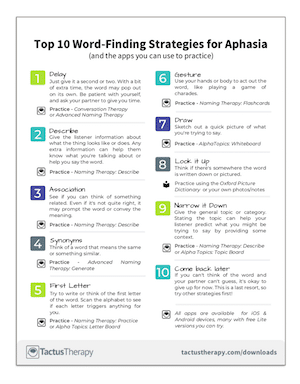
In addition to receiving your free download, you will also be added to our mailing list. You can unsubscribe at any time. Please make sure you read our Privacy Policy and Terms & Conditions.
Training Word-Finding Strategies using Apps
It’s important to practice using word-finding strategies in a supported environment with the help of a speech therapist or trained partner. The more you practice a strategy, the easier it will be to use when you need it. Many of the Tactus Therapy apps for aphasia can be used to practice word-finding strategies in the clinic or at home.
Naming Therapy
To practice describing (strategy #2), giving associates (strategy #3) and naming the category (strategy #9), use the Describe activity in Naming Therapy. The icons surrounding the pictures ask you questions that make you think about the various features of the objects and actions. The activity is based on the evidence-based treatment of semantic feature analysis.
Use the Naming Practice activity to give yourself the first letter of the word (strategy #5). The cueing hierarchy gives you increasingly helpful hints to say the word. If you find the First Letter cue useful, you can start trying to think of the first letter yourself.
Practice gesturing words (strategy #6) using the 700+ words in the Flashcards activity.
Traveler’s dictionaries and ESL photo dictionaries are excellent communication tools. The Oxford Picture Dictionary is a staple, and comes in an app. Other great apps include BabelDeck and ICOON. Put them on your iPhone or iPad so you’ll have them when you need them (strategy #8).
Advanced Naming Therapy
Practice coming up with synonyms (strategy #4) using the Generate activity in Advanced Naming Therapy.
This app also provides an excellent opportunity to practice using all the word-finding strategies when you talk about the fun pictures in the Describe activity and discuss the concepts in the Compare activity.
AlphaTopics
The whiteboard feature of AlphaTopics is perfect for writing the first letter or whole word (strategy #5) or for drawing a quick picture (strategy #7).
Use the letter board to scan the alphabet (strategy #5) or the topic board to help you narrow-in on the subject (strategy #9).
Conversation Therapy
Once you’ve learned all these strategies, you can put them to use by answering the 10 different question types in Conversation Therapy. Ask for a few extra seconds (strategy #1) to think of the word when you get stuck. Then try the other strategies if the words still won’t come.
Not sure which apps to try? Our App Finder can help! Most apps have a free version for you to try.
Like this article? Learn “How To” do a lot more evidence-based speech therapy treatments in our full series of How To articles.
If you liked this article,
Share It !

Megan S. Sutton, MS, CCC-SLP is a speech-language pathologist and co-founder of Tactus Therapy. She is an international speaker, writer, and educator on the use of technology in adult medical speech therapy. Megan believes that technology plays a critical role in improving aphasia outcomes and humanizing clinical services.
More in ‘How To’
- It is normal for word-finding problems to increase as we age
- It is normal for us to be slower in processing information as we age
- Difficulty in retrieving words does not mean the words are lost; there is no evidence that we lose vocabulary in normal aging
- There is little evidence for any change in semantic structure (the organization of words in memory) with age
- Older adults probably have more trouble dealing with large amounts of information
- Older adults may develop different strategies as they age, probably to accommodate their decline in processing speed and processing capacity
What do we mean by word-finding problems?
Here are some examples:
- increasing use of circumlocutions rather than specific terms (e.g., «I wonder where the thing that goes here is»)
- use of empty phrases, indefinite terms, and pronouns without antecedents (i.e., referring to something or someone as «it» or «him / her» without first identifying them by name)
- increased frequency of pauses
These problems are all characteristic of Alzheimer’s, but also, to a much lesser extent, of normal aging.
Verbal fluency declines with age
Verbal fluency is measured by how many words fitting a specific criteria you can generate in a fixed time (for example, how many types of fruit you can list in a minute).
Verbal fluency often (but not always) declines as we age. This may be partly because older adults are slower to access information.
Tip-of-the-tongue experiences increase with age
There is no evidence that normal older adults actually lose the meanings of words they know.
Older adults do however have more word-finding problems than younger adults. In particular, as we get older we tend to experience more experiences when the word we are searching for is «on the tip of my tongue» [1]. (For more detail about this, see the research report at Burke 1991)
Picture-naming errors also increase, though not perhaps until the eighties [2].
Some studies have found a decline in older adults’ ability to produce words when given their definitions, but others haven’t. This may relate to strategy differences.
No structural changes to memory in normal aging
So, older adults do show some of the same type of word-finding problems as Alzheimer’s patients do, but to a considerably smaller degree. There is little evidence however that this decline is due to any structural changes in semantic memory with age. Normal younger and older adults give the same sort of responses. (Alzheimers patients on the other hand, become more eccentric in their word associations).
Older adults may tend to use different memory strategies than younger adults
While older adults are slower to make category judgments (e.g., «Is a tomato a fruit? True or false»), they do not give responses different from those of younger adults, supporting the view that semantic organization hasn’t changed. However, there is some evidence that young and old differ in the way they judge similarity (older adults seem to rely more on distinctive features; younger adults use both common and distinctive features). This may however be due to strategy differences.
There is no evidence for any decline in prose comprehension with age. However, when there is a large load on memory (when the text is complex, for example), older adults find retrieving general knowledge more difficult.
It appears that encoding of new information might become less context-specific with age, but this may only relate to particular types of context information. It might only be that older adults are less inclined to attend to such (largely irrelevant) details as: whether something was printed in upper or lower case; the sex of a speaker; the color in which a word is printed. The temporal and spatial contexts are also likely to be less important. In other words, older adults seem to encode less information about the source of new information (the circumstances in which the information was acquired) than younger adults.
References
- Light, Leah L. The organization of memory in old age. In Craik, Fergus I. M. & Salthouse, Timothy A. (eds). 1992. The Handbook of Aging and Cognition. Hillsdale, NJ: LEA. Pp111-165.
- Burke DM, MacKay DG, Worthley JS, & Wade E. 1991. On the tip of the tongue: What causes word finding failures in young and older adults? Journal of Memory and Language, 30, 542-79.
Cohen G & Faulkner D. 1986. Memory for proper names: Age differences in retrieval. British Journal of Developmental Psychology, 4, 187-97. - Albert MS, Heller HS, & Milberg W. 1988. Changes in naming ability with age. Psychology and Aging, 3, 173-8.
Borod JC, Goodglass H, & Kaplan E. 1980. Normative data on the Boston Diagnostic Aphasia Examination, Parietal Lobe Battery, and the Boston Naming Test. Journal of Clinical Neuropsychology, 2, 209-15.
Van Gorp W, Satz P, Kiersch ME & Henry R. 1986. Normative data on the Boston Naming Test for a group of normal older adults. Journal of Clinical and Experimental Neuropsychology, 8, 702-5.
Mitchell DW. 1989. How many memory systems? Evidence from aging. Journal of Experimental Psychology: Learning, Memory & Cognition, 15, 31-49. (no age effect found).
Search for Solutions Here:
Word Retrieval / Word Finding Strategies & Activities
What Is Word Retrieval / Word Finding?
Word finding, also called “word retrieval”, is a person’s ability to think of the right word when he/she needs it, such as during conversation. We all have those moments when we can’t think of the right word, in that instant, we’re having a word finding or word retrieval problem. Sometimes, children with language delays (and even those without) may have difficulty with word finding. This may cause them to have unnecessary pauses, use filler words like “um” and “like”, or use non-specific words like “that thing” or “that stuff”.
Word Finding Strategies:
What can be done to help a child who is struggling with word finding or word retrieval? Speech therapy is often helpful for a child who is struggling to find the right words. Several strategies and activities have been shown by research to help a child improve their word-finding abilities. The two main methods for improving word retrieval are semantic strategies and phonological strategies.
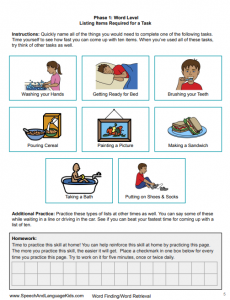
Word Finding Activities
Activities and Strategies for Speech Therapy
Semantic Strategies for Word Finding
Semantic strategies for word finding are those that help the child learn more about the meaning of words and use those word meanings to build stronger brain pathways to those words, thus helping the child retrieve them more easily when needed. The following activities are all strategies that can build a child’s semantic skills for word finding:
- Categorization: Putting words into categories or naming as many words from categories as possible
- Attributes: Providing attributes/descriptors for specific words and using attributes to define words
- Associations with Other Words: Associating words that are related by function, composition, or other attributes, or by part-whole relation
Wright et. al. (1983) studied the use of these semantic strategies in language impaired children and found that this type of therapy resulted in highly significant improvement in naming pictures.
Phonological Strategies for Word Finding
Phonological strategies for word finding focus on helping a child better learn how the word sounds and its phonological makeup. The following word finding strategies are examples of activities that can be used to improve a child’s phonological representation of words:
- Syllabification: A target word is broken down into individual syllables. The child counts how many syllables are in the word
- Sound Segmentation: A target word is broken into individual speech sounds. The child counts how many sounds are in the word
- Rhyming: A target word is matched with rhyming words/pictures. The child supplies rhyming words for the given word
- Imagery: The child looks at a picture of the word while the therapist says the word out loud. Then, the child closes his eyes and is asked to “see the picture in your mind” and “hear my voice saying the name of it in your mind”.
Wing (1990) studied the use of these phonological strategies in language impaired children and found that the subjects receiving the phonological treatment improved significantly in naming pictures.
Word Finding Strategies Using the Semantic Approach:
The following are examples of speech therapy activities that can be used to improve word finding/word retrieval using the semantic approach described above. These activities are also great for use by caregivers and teachers to boost language skills and word finding skills at home and in the classroom as well.
Word Retrieval Activity 1:
Fill in the Blank Associations
Have the child fill in the blank with common phrases and sentences. This will teach the child to use other words in the sentence or phrase to trigger the word he wants to get to. Here are some examples of fill in the blank associations you can use with your child. Try these while you’re riding in the car or waiting in line somewhere.
-
- A pair of _____
-
- Peanut butter and ______
-
- Close the _______
-
- The elephants live in the _____
-
- Head, shoulders, knees, and ______
Word Retrieval Activity 2:
Rapid Naming from Categories
Have the child list as many things as possible from a certain category. For example, have the child list as many foods as he can or as many clothes. You could write down how many he thought of each time so he can see the progress he makes as he does this activity more and more.
Word Retrieval Activity 3:
Providing a Word from a Definition
Define a word for the child and see if he can guess what it is. For example, you could say “it’s a red fruit that is juice and sweet and sometimes comes in green and yellow” and see how long or how many cues it takes for the child to guess apple. You can switch this around and have the child define a word for you as well.
Word Retrieval Activity 4:
List Things Needed to Complete a Task
Tell the child the name of a task and ask her to tell you all of the things she would need to complete that task. For example, if the task is swimming, the child could say “goggles, swimsuit, floaties, innertube, pool toys, towel”.
Word Retrieval Activity 5:
Finish Similes
A simile is when you say that something is ____ as a _____. Provide the descriptive word for the child and have him finish the simile. For example, you could say “sticky as a ____” and the child might fill in “peanut butter sandwich”.
Word Retrieval Activity 6:
Antonyms and Synonyms
Tell the child a word and have her come up with one synonym (a word that means the same thing) and one antonym (a word that means the opposite).
Word Retrieval Activity 7:
Part to Whole
Give the child a word and have the child list as many parts of that item as possible. For example, if the word is “car”, the child could list tires, doors, seats, steering wheel, etc. Then, have the child list something that the word is a part of (its whole). For example, with the word “car”, the whole could be “traffic”, “vehicles”, or “transportation”. These don’t have to be perfect, just try to come up with some associated words.
Worksheets for Word Finding and Word Retrieval:

Word Finding Strategies Kit
No-Prep Therapy Activities/Worksheets

About the Author: Carrie Clark, MA CCC-SLP
Hi, I’m Carrie! I’m a speech-language pathologist from Columbia, Missouri, USA. I’ve worked with children and teenagers of all ages in schools, preschools, and even my own private practice. I love digging through the research on speech and language topics and breaking it down into step-by-step plans for my followers.
Fun Fact: My kids and I all have had weird food reactions over the years. We’ve narrowed it down to knowing that gluten and dairy can only be eaten every once in a while. We’ve done multiple Whole30 elimination diets to help tease it all out. Food intolerances are HARD.
Connect with Me:
Share This Story, Choose Your Platform!
Related Posts
11 Comments
-
shannon
August 30, 2014 at 8:25 pm — ReplyI like some of the things I see here but it seems to me that what I have found is too advanced for my daughter at this time. Where can I find more elementary suggestions?
-
This article on word retrieval is definitely a little more advanced. For word retrieval in younger children, I would try to come up with similar tasks that are easier, such as describing something that they know, such as “what’s a red, juicy, fruit?” or “what do you play with?”. Or, I would show the child pictures of various things and have the child tell me what they’re called. Are there other skills that you’re wanting to work on besides word retrieval that I can point you to?
-
-
I’m trying to generate a better understanding for the teachers and staff in my building for students who experience word finding. Just want to share some good strategies that they can implement in the classroom as well. I use strategies #1 & 2 in my sessions a lot. This is very helpful. Thanks 🙂
-
You are very welcome! Thank you for sharing my info!!
-
-
Melissa
May 20, 2019 at 3:52 pm — ReplyAwesome activities! Thank you!
-
Kena Roth
May 21, 2019 at 9:28 am — ReplyYou are more than welcome, Melissa! Please let us know if you have any questions.
-
-
Suki
November 18, 2019 at 10:55 am — ReplyAre their any pointers for middle school children having to take a foreign language? My daughter studies and studies but cannot pull the words up for the test. We are struggling and her school isn’t exactly helpful. We know she has RAN and she copes well in most subjects, but learning a new language is proving next to impossible.
-
Kena Roth
December 4, 2019 at 9:55 am — ReplyHello, Suki!
Thank you so much for reaching out. Unfortunately, we get a ton of questions every day about how to solve specific speech/language problems. Since we have such a small staff, we aren’t able to answer every question that comes through on the website, social media, or via email. If you are a parent, we suggest you reach out to a local speech-language pathologist who can work with your child directly and answer your question.
If you are another speech-language professional, we have created a membership where we pay a full staff to answer questions like this on a regular basis. We would be more than happy to answer your question inside the membership program. We’re able to answer more questions in here because we have a full library of questions that we’ve already answered so our staff can either link you to the answer if it exists, or write you a custom response if needed. We’d love to see you inside the membership!
Click Here to Become a Member: https://www.slpsolution.com/pediatric-signup/.
-
-
Sharon
April 20, 2021 at 9:19 am — ReplyWhat do you suggest for a post-teen with severe stuttering issues? He didn’t get a lot of therapy growing up. Any suggestions would be greatly appreciated.
-
Kena Roth
April 20, 2021 at 1:20 pm — Reply
-
-
This article’s very useful. Thank you
This site uses Akismet to reduce spam. Learn how your comment data is processed.
Page load link

This website uses cookies so that we can provide you with the best user experience possible. Cookie information is stored in your browser and performs functions such as recognising you when you return to our website and helping our team to understand which sections of the website you find most interesting and useful.
Strictly Necessary Cookie should be enabled at all times so that we can save your preferences for cookie settings.
Enable or Disable Cookies
If you disable this cookie, we will not be able to save your preferences. This means that every time you visit this website you will need to enable or disable cookies again.
Go to Top

